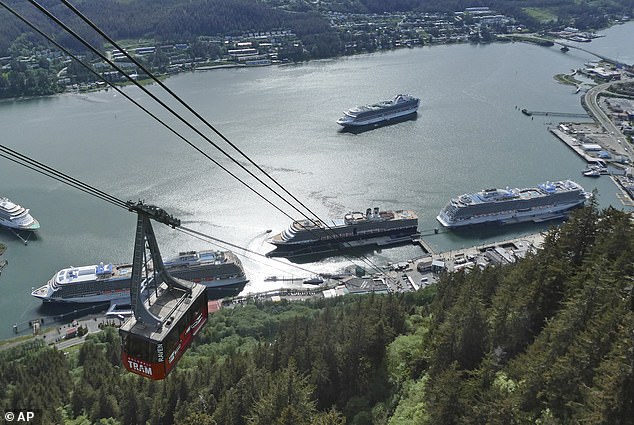Voters living in Alaska’s capital could approve a measure that would severely limit cruise ships, a potential victory for locals long angered by the endless flow of tourists.
The measure, if approved Oct. 1, would ban cruise ships with 250 or more passengers from docking in Juneau on Saturdays, preventing throngs of visitors from seeing wonders like the rapidly melting Mendenhall Glacier.
It would also ban boats on July 4, a day when locals flock to a popular parade downtown.
The “boat-free Saturdays” initiative was voted on this week, although there is a slim chance that the local assembly will enact it before it goes to voters.
Many of the 32,000 residents of Juneau, a city accessible only by water or air, are simply fed up with increasing traffic, congested hiking trails and the frequent drone of tourist helicopters ferrying visitors to Mendenhall and other glaciers.
Cruise ships are shown near downtown Juneau on June 7, 2023, along the Gastineau Channel, Alaska. Voters in Alaska’s capital could decide in October whether to ban large cruise ships on Saturdays starting next year.
Long-time resident Deborah Craig supports Boat-Free Saturdays because she is particularly affected by the hustle and bustle of tourism, as she lives across the canal from where the boats dock.
Almost every morning, he hears foghorns and passenger announcements.
She said the “overwhelming” number of visitors diminishes what she and others who have lived in Juneau for decades love about the city.
“It’s about preserving the way of life that keeps us in Juneau, which is about clean air, clean water, pristine environment and easy access to trails, easy access to water sports and nature,” he said of the initiative.
“There is a perception that some people are not welcoming to tourists, and that is not the case at all,” Craig added.
“It’s a matter of volume. It’s just too much, too much in a short period of time that it overwhelms a small community.”
The current cruise season runs from early April to late October.
Opponents of the measure say restricting tourism on a peak day like Saturday will hurt local businesses with decreased foot traffic, adding that if approved, the city could be sued.
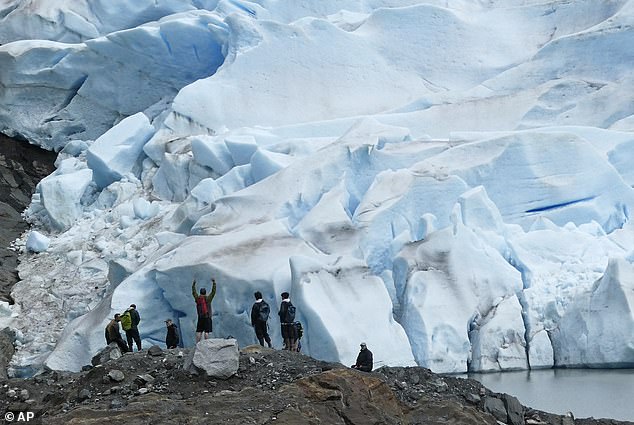
A group of people take in the view of Mendenhall Glacier on June 8, 2023, near Juneau.
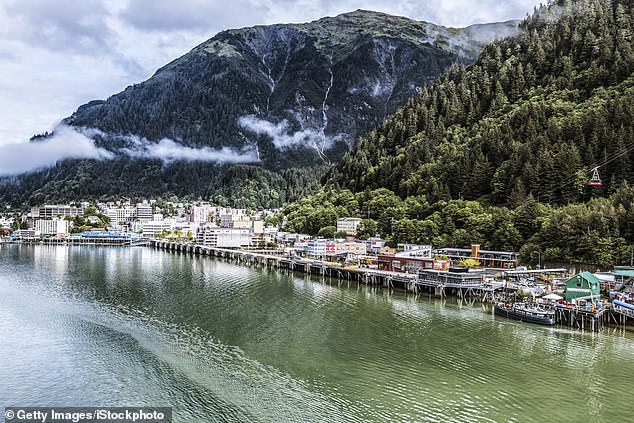
Panoramic view of downtown Juneau, which faces the Gastineau Channel
They noted that a voter-imposed limit on cruise ship passenger numbers in Bar Harbor, Maine, was challenged in federal court last year.
Laura McDonnell, owner of Caribou Crossings gift shop in downtown Juneau, said she gets 98 percent of her revenue during the summer season.
Tourism is about all the “local businesses that rely on cruise ship passengers and our place in the community,” said McDonnell, who is involved with Protect Juneau’s Future, which opposes the initiative.
At a time when regional economic challenges are rampant and schools are closing due to declining enrollment, McDonnell said voters in favor of the measure should really rethink their position.
“I think as a community we really need to look at what’s at stake for our economy,” he said. “We’re not in a position to downsize our economy.”
The cruise industry accounted for $375 million in direct spending in Juneau in 2023, the majority of which was attributable to passenger spending, according to a report prepared for the city by McKinley Research Group LLC.
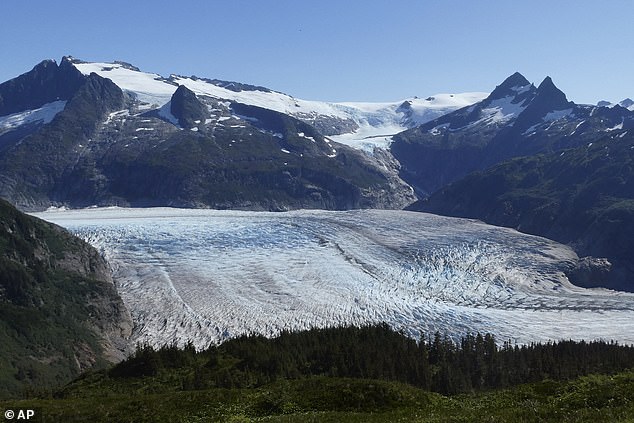
The face of Mendenhall Glacier is seen from the Mount McGinnis trail in Juneau on Sunday, Aug. 20, 2023. The glacier flows into Mendenhall Lake.
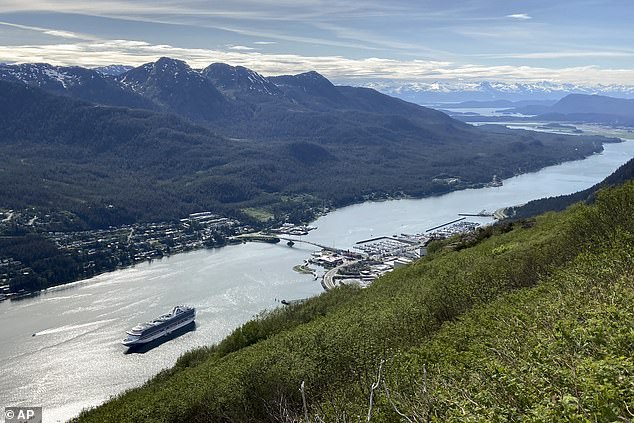
A cruise ship departs downtown Juneau on June 7, 2023, along the Gastineau Channel.
After a two-year pause due to the pandemic, cruise passenger numbers have risen dramatically in Juneau, reaching a record of more than 1.6 million in 2023.
According to this year’s calendar, September 21 will be the first day since early May without large ships in the city.
The debate between people like Craig, who want to preserve Juneau’s quiet beauty, and people like McDonnell, who have a business to run, will likely continue in the months leading up to the vote.
As such, the city has been trying to find a middle ground, said Alexandra Pierce, Juneau’s tourism industry director.
He added that a regional solution must be found, not just one tailored to Juneau.
She explained that if the Juneau resolution passes, it will affect smaller cities and towns in southeast Alaska because ships, typically on trips originating in Seattle or Vancouver, Canada, will have to go somewhere if they can’t dock in Juneau on Saturdays.
But some smaller communities like Sitka, which is south of Juneau and home to a volcano, have also expressed support for limiting cruises.
The middle ground Juneau has tried to reach involves reaching agreements with major cruise lines to reduce the overall number of ships.
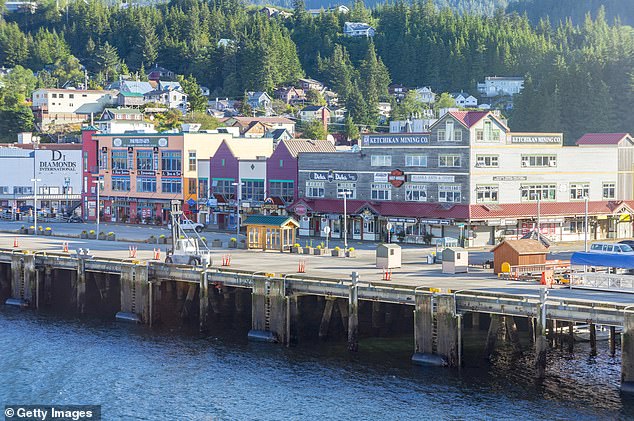
Close-up view of downtown Juneau. A Harley Davidson store can be seen.
The city and Carnival, Disney Cruise Line, Norwegian Cruise Line and Royal Caribbean Group have agreed to a limit of five large ships per day.
That limit went into effect this year.
They also recently signed a pact, which will come into force in 2026, limiting the number of cruise passengers to 16,000 on Fridays and 12,000 on Saturdays.
Pierce said the overall goal is to keep total cruise passenger visits at about 1.6 million during the summer, and to balance out daily visitor numbers that can increase to about 18,000 on busier days.
In the past, peak days have felt “a little stifling,” he said.
Renée Limoge Reeve, vice president of government and community relations for the trade group Cruise Lines International Association Alaska, said the agreements signed between the city and cruise lines were the first of their kind in Alaska.
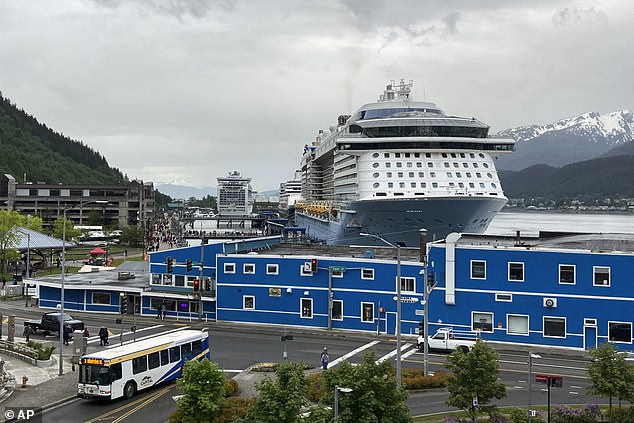
Cruise ships docked June 9, 2023 in downtown Juneau.
Protect Juneau’s Future, led by local business leaders, said the ballot measure’s success would mean a loss of sales tax revenue and millions of dollars in direct spending by cruise ship passengers.
The group was confident voters would reject the measure, its steering committee said in a statement.
Karla Hart, sponsor of the initiative and a frequent critic of the cruise industry, said the threat of litigation has prevented communities from taking action to limit the number of cruises in the past.
He noted that the defendants scored some important legal victories this year in the companies’ ongoing lawsuit over a similar measure passed in Bar Harbor, a popular destination near Maine’s Acadia National Park.
Hart believes the initiative will pass in Juneau.
“Every person who is going to vote has a lived experience and knowledge of how the cruise industry impacts their lives,” he said.

